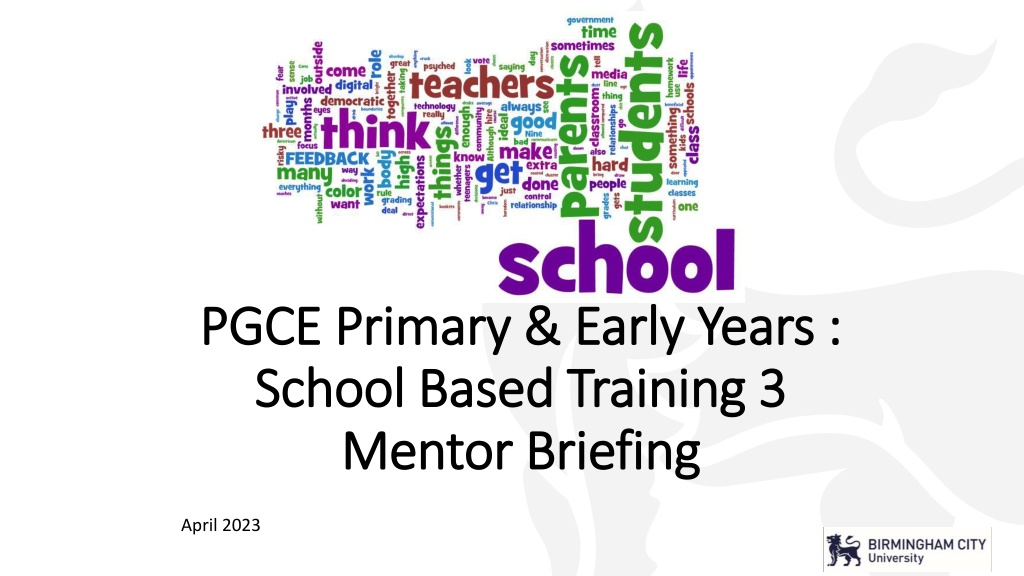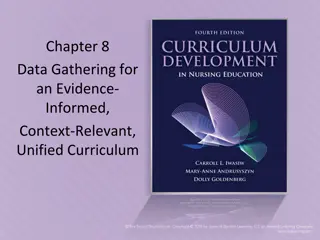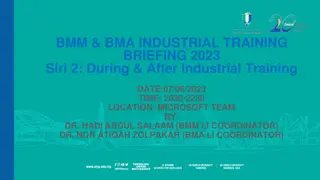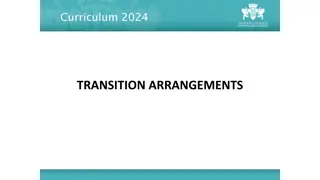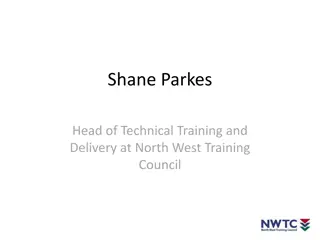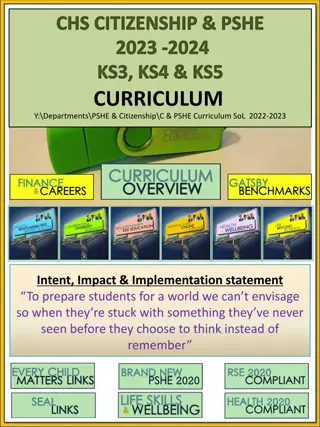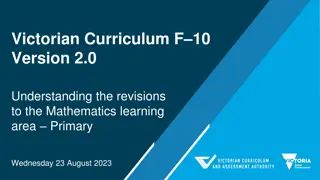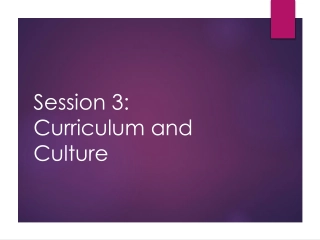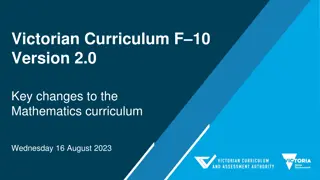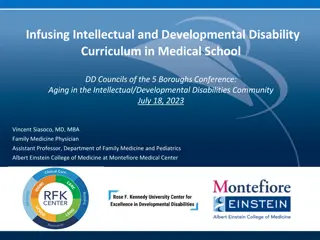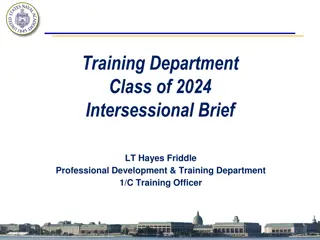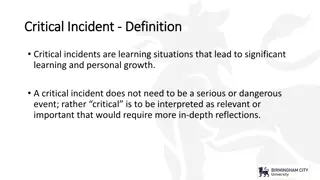BCU ITE Curriculum and School Based Training 3 Mentor Briefing
The BCU ITE Curriculum focuses on key themes such as critical inquiry, effective teaching practices, behavior management, subject knowledge application, planning and assessment, adaptive teaching approaches, and professional behaviors. School Based Training 3 includes preliminary visits, online sign-off, block placement dates, review and progress meetings, debrief, and university days. Associate Teachers are responsible for maintaining a Progress Journal and completing tasks for sign-off. School induction covers child protection, health and safety, school routines, staff roles, and school expectations.
Download Presentation
Please find below an Image/Link to download the presentation.
The content on the website is provided AS IS for your information and personal use only. It may not be sold, licensed, or shared on other websites without obtaining consent from the author. Download presentation by click this link. If you encounter any issues during the download, it is possible that the publisher has removed the file from their server.
Presentation Transcript
PGCE Primary & Early Years : PGCE Primary & Early Years : School Based Training 3 School Based Training 3 Mentor Briefing Mentor Briefing April 2023
The BCU ITE Curriculum BCU ITE CurriculumKey Themes A. How traineesuse critical enquiryand researchinformed practiceto develop their understandingof effective teachingand learning. B. How classroom practice establishes effective behaviour management through the use of high expectationsandawareness of pupilwellbeing. C. Associate Teacher knows more, remembers more and applies subject knowledge and subject specific pedagogy to impact on pupils progress. D. How traineesplan and assesslearning to ensurethat all pupilsmake progress. E. Associate Teacher implements effective adaptive teaching approaches to meet all learners needs, including SEND (Special Educational Needs and Disability) and EAL (English as an Additional Language learners). F. How trainees have developed professional behaviours and contribute effectively to the widerlife of the school.
School Based Training 3 Preliminary Visits: 24th April 28th April UT sign off: 28th April ONLINE Block Placement Dates: 2nd May 30th June Review Meeting 3: WB: 15th May Progress Meeting 3: WB: 26th June UT Debrief: 3rd July ONLINE University Days: Thursday 25th May and Friday 26th May
Progress Progress Journal Journal It is the Associate Teacher s responsibility to keep their Progress Journal up to date. Preliminary Tasks Associate Teacher Learning Observation Checklist of tasks that need to be completed for sign off BCU Assessment Tracker Attendance register Targets page Weekly Meeting and Target Setting Review/Progress Meetings Critical Incidents
School Induction Child Protection and Safeguarding information Health and Safety Briefing Access to relevant policies including: Behaviour Management; SEND; Assessment, Marking and Feedback; Teaching and Learning; Core Subjects Overview of the school day including: school routines e.g. start and end of day, playtimes, lunchtime, assemblies, extra-curricular activities, meetings Overview of staff including roles and responsibilities Outline of the school s expectations including: time keeping, dress code, behaviour management, e safety, use of social media, planning OFSTED report and the school s priorities
UT Sign off Meeting Online This will take place on Friday 28th April Online Meeting between the Associate Teacher and the University Tutor Can Associate Teachers please meet with their University Tutor while they are in school Associate Teachers should be in school all day
Planning Expectations Associate Teachers will start with a 60% teaching timetable This teaching time should build so that for the last two weeks of the placement the Associate Teachers should be teaching 80% of the time Associate Teachers should be given the opportunity to teach subjects that they have not yet had opportunity to Schools own planning proforma s can be used unless otherwise stated for specific Associate Teachers It is mandatory that Associate Teachers use the BCU planning proforma for observation lessons Associate Teachers should be planning sequences of lessons across the curriculum
WeeklyMeeting & Target Setting These meetings provide an opportunityto identify what the Associate Teachers have learnt and how they have learnt it. It is also an opportunity to discuss strengths and skills, knowledgeand practice theyneed to develop. Review targets set from the week before and set new targets Please add a mentor comment relating to progress towards the BCU curriculum
Weekly Meeting & Target Setting Associate Teachers should be sharing their Subject Specific Development Journal at the Weekly Meetings. They should be talking to you about how their subject knowledge has developed with links to learning from university and how they have applied it in the classroom. Using this document subjects not yet taught can be clearly identified
Weekly Meeting & Target Setting Comments should be made relating to Professional Studies such as Behaviour Management, relationships with parents/carers, the wider roles and responsibilities of a teacher, planning and assessment. Areas taught in Professional Studies can be seen in the PGCE Curriculum Document
Each subject has identified the key learn that and learn how to statements
Lessonobservations Use BCU Lesson Observation Feedback Form Use Subject Feedback Prompts to support observation feedback First observation in Week 1 of School Based Training block One observation per week One joint observation per School Based Training with University Tutor
Previous Targets: 1. 2. 3. Lesson Intent: e.g. How does the Associate Teacher review learning at the start?Is children s prior learning built on? Is the lesson intent made clear? To include the use of additional scaffolds as part of adaptive teaching approaches. To plan tasks that provide greater challenge. To plan appropriate AfL opportunities at different points within the lesson. - Arithmetic start appropriate pitch of multiplication questions and clear modelling / guided practice of the formal multiplication method. This reviewed previous procedural knowledge and fluency in calculation and declarative knowledge of multiplication facts. Starter - Multiplying a fraction by an integer built on previous learning and reviewed procedural knowledge Lesson Learning Objective shared with the children and made clear. LO: To divide a fraction by an integer Subject knowledge: Key Theme C - (A & F) e.g. how is the Associate Teacher demonstrating accuracy, breadth and depth of subject knowledge? Use Subject Prompt Sheet to support. Effective Feedback in Lesson Observations - - - Good use of mathematical vocabulary e.g. numerator, denominator, equivalent, simplify - 2/3 - a whole has 3 parts, and we have 2 parts. Definitions of key mathematical vocabulary made explicit. Simplifying fractions can it be simplified? Can you explain? opportunities for reasoning and mathematical thinking. Division of fractions by an integer - modelling showed good subject knowledge and there were appropriate examples used the representations used supported understanding of dividing fractions by exposing the structure of the question. Questions and tasks were carefully ordered to help pupils make connections and to deepen the understanding. - - - Planning and assessment: Key Theme D (A & F) e.g. how is the Associate Teacher presenting new knowledge in small steps? How does the associate teacher check for understanding? How is questioning used to good effect? - - Planning shows where this lesson fits within a sequence of learning. The lesson was planned clearly using the BCU format and the PowerPoint Presentation with White Rose resources adapted. The learning had a clear sequence that built over the lesson. When planning, anticipate misconceptions and include then in the main teaching as key learning points. School policy on marking was followed. This supported you in making assessments and identifying which children needed further support within the lesson. A child who was not confident to start the independent task was initially supported by the TA. Later in the lesson you went over to check understanding which was good to see. Self-assessment made at the end of the lesson linked to the LO - - - - - It was evident that you are working on the target set previously
Adaptive teaching: Key theme E (A & F) e.g. how does Associate Teacher use scaffolding and support for all learners? How is independent learning encouraged? How are models and examples used to support pupil progress? How are pupils challenged? - A target was to apply adaptive teaching approaches, such as scaffolding. The use of images and modelling scaffolded the learning- slow down with some of the modelling to ensure that the children see the clear model and talk thought your modelling more explicitly to enable children to focus on you articulating your thinking. - The tasks planned had different levels of challenge which were set based on assessment made in previous lesson. Extension tasks provided challenge and further opportunities to problem solve. Classroom practice: High expectations and managing behaviour Key theme B (A & F) e.g. how does the Associate Teacher develop a purposeful learning to ensure good progress for all pupils? - Good relationship developed with the children You had a good presence, with most of the children engaged throughout the lesson. - Clear and precise instructions - Clear time expectations and noise level reminders. - A range of strategies used effectively - countdown to bring the children back together and hand up the children responded well. - Towards the end of the lesson there were some off task behaviours. This was possibly due to the length of time on the independent task. The behaviours were picked up and addressed but consider how you can bring the class back together to refocus the learning. Impact on learning: What have the children learned? Is the learning related back to the Lesson Intent? Effective Feedback in Lesson Observations The children were able to achieve the LO. This was evident in looking at the children s work, talking to the children and through their self-assessment at the end of the lesson. Key Strengths Following the observation, through professional dialogue, please identify key strengths and targets for the Associate Teacher in the context of raising pupil achievement and supporting children s learning. 1. Subject knowledge of dividing fractions by an integer and related vocabulary. 2. Key elements included within the lesson declarative knowledge to support procedural fluency, retrieval of prior learning, modelling, scaffolding, opportunities for reasoning and problem solving. BCU Key Theme C D B 3.Good relationships developed and a clear presence established in the classroom. The children are clearly aware of the learning and behaviour expectations. Possibilities, Issues, Reflections and Targets From the discussion, please agree SMART targets. Targets will be reviewed through Weekly Professional Development Discussions and subsequent observations. If a RIT is identified, please complete a RIT Form, stating clearly when targets will be reviewed. Highlight a RIT by writing RIT next to the action point. 1. Spend more time on modelling and guided practice with opportunities for the children to hear you articulate your thinking and practice their own mathematical talk. Five Ways to Secure Progress Through Modelling teacherhead BCU Key Theme C / D D 2.At the planning stage identify and anticipate any misconceptions, then use these for a teaching point. There was a task where children identified a misconception, it would be appropriate to include this in your main teaching too. 3. Low level off task behaviours consider how the lesson timings could be altered to reduce this or how you could bring the children back together to refocus the learning. B
Review Meeting/Progress Meeting One of these should be completed face to face The other is then completed online In attendance there should be the UT, Associate Teacher and a Mentor from the school
Review Meeting 3 Discussion of Critical Incident written by Associate Teacher prior to Review Meeting. Focus of Critical Incident: Assessment linked to a subject Discuss progress in relation to Assessment Tracker If on track discuss next steps If not on track follow RIT process
Progress Meeting 3 Discussion of Critical Incident written by Associate Teacher prior to Progress Meeting Critical Incident Focus for each Progress Meeting is a choice of: Phonics/Subject Specialism/Area of Associate Teacher Reflection/Learning Discuss progress in relation to Assessment Tracker Discuss Achieving QTS Reflection linking BCU Key Themes to Teacher Standards. This is in the Progress Journal after the Assessment Tracker. This should be completed by the Associate Teacher prior to the Progress Meeting. (This is used as part of their Standards Completion Meeting discussion with their PDT back in university)
Critical Incident - Definition Critical incidents are learning situations that lead to significant learning and personal growth. A critical incident does not need to be a serious or dangerous event; rather critical is to be interpreted as relevant or important that would require more in-depth reflections.
Critical Incident BCU Assessment tracker is used to identify key areas of progression Associate Teacher shows how they are progressing toward the BCU Curriculum Key Themes The Critical Incident is the Associate Teacher s opportunity to show and prove how they are progressing and developing.
Assessment of School Based Training Review Meeting 3 (SBT 3) Associate Teachers who are on track to be awarded QTS at the end of the course will be demonstrating their competence in 75%of each of the BCU Curriculum Themes at the Working At Level. If the Associate Teacher is not able demonstrate competence in in all of the BCU Curriculum Themes at the Working Towards Level and 50% in the Working At Level their progress is judged as requiring improvement. The Associate Teacher will become subject to the Rapid Improvement process and targets and strategies for improvement will be identified and a Rapid Improvement Targets (RIT) form will be completed.
Rapid ImprovementTarget Issued if Associate Teachers: Are not making expectedprogress; Are not demonstrating high standards ofpersonal and professionalconduct. All RITs should be emailed to: PrimaryandEarlyYearsPGCECourseTeam@bcu.ac.uk Details of the process will be explained if necessary.
Assessment of School Based Training Progress Meeting 3 (SBT 3) . Associate Teachers who are on track to be awarded QTS at the end of the course will be demonstrating their competence in all elements of all of the BCU Curriculum Themes at the Working At Level. Associate Teachers demonstrating their competence at the Working Beyond level can be deemed to have made very good progress in readiness for their ECT year. Associate Teachers not demonstrating their competence in all the BCU Curriculum Themes at Working At level and/or not fully engaged or responding to advice and feedback will have FAILED SBT3.
Termination of Placements Termination of Placements Where a termination of placement occurs the circumstances are considered by the Placement Review Panel and recommendations made regarding further placements and actions to be undertaken. Resitting a School Based Training placement, as a consequence of a failed first attempt, will incur a cost to the trainee of 1125. The trainee may be eligible for funding, but this should be discussed with Student Finance England direct to confirm details and determine whether there is eligibility. There may be exceptional circumstances where this fee can be waived; however the tutor will confirm this in writing to the trainee where such a circumstance will apply.
Associate Teacher Folder Ensure that Associate Teacher has shared with you their OneDrive folder This has all of the documentation needed for their placement
Mentor Support - Access to all our University documentation, mentor CPD and partnership information. https://www.bcu.ac.uk/education-and-social-work/partnerships-and- collaborations/primary-early-years-partnerships
Just so that you are aware we are expecting Ofsted therefore we may be contacting you when they get in touch if they ask to see the Associate Teacher in your school. If your school is chosen by Ofsted we will support you with questions that may be asked.
Useful Contacts PGCE Course Team: PrimaryandEarlyYearsPGCECourseTeam@bcu.ac.uk Education Partnerships Team: Martin Drury martin.drury@bcu.ac.uk (PGCE) Primary Partnership Lead: Anne Whitacre anne.whitacre@bcu.ac.uk
And finally. Any Questions?
